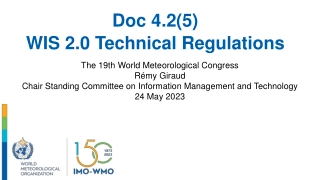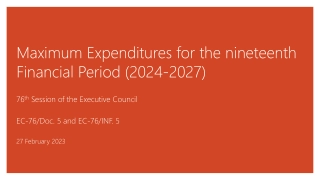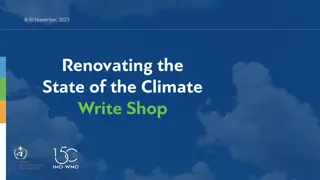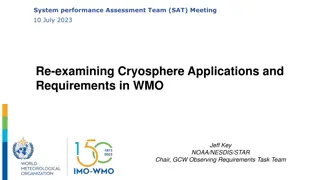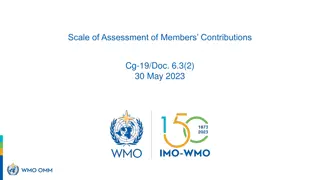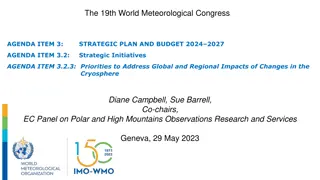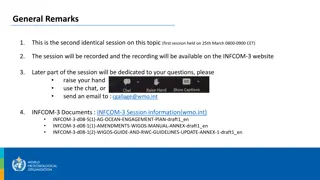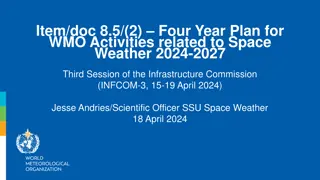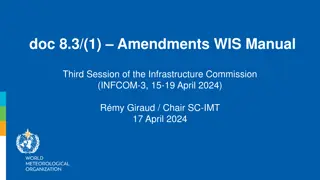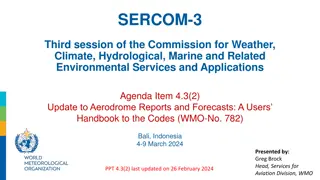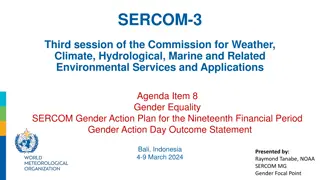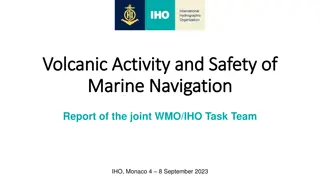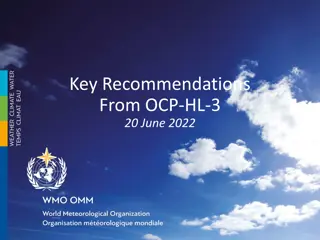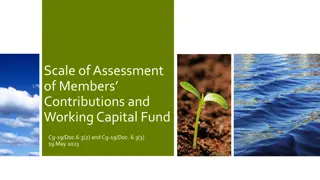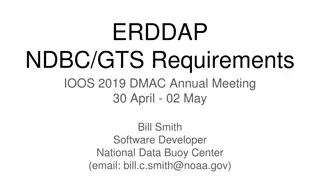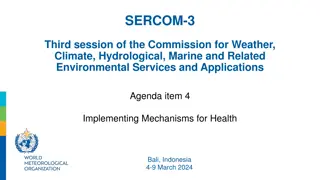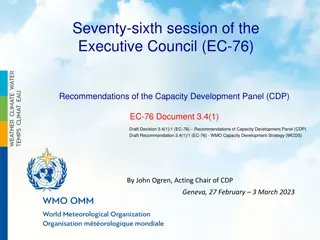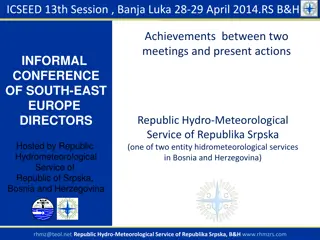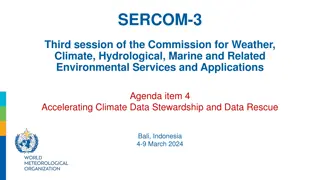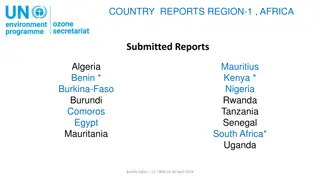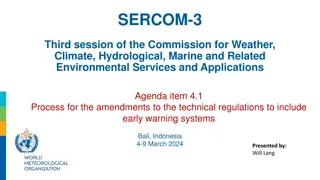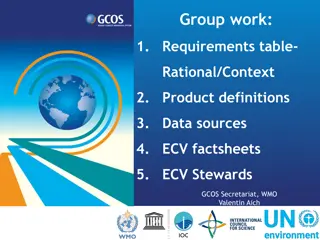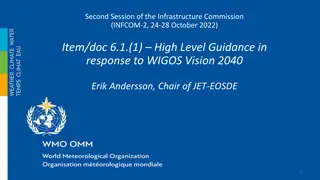Doc 4.2(5). WIS 2.0 Technical Regulations
The resolution urges Members to adopt changes in the WMO Information System manual. It emphasizes the need for technical and regulatory frameworks for WIS 2.0 implementation, supporting it with funding and secondments. The resolution requests the development of procedures for WIS 2.0 Global Services
2 views • 10 slides
Maximizing Expenditures for 2024-2027 Financial Period
Explore WMO's Strategic Plan 2030 and objectives for the 76th Executive Council session, focusing on enhancing services, Earth system observations, and climate information. Highlighted areas include sustainable infrastructure investment, policy-relevant science, and inclusive participation. Embrace
2 views • 41 slides
Initial Composition and Requirements of GBON for Effective Meteorological Monitoring
The 19th World Meteorological Congress established the Global Basic Observing Network (GBON) to enhance meteorological monitoring worldwide. The GBON includes specific resolutions, guidelines, requirements, and compliance criteria for surface land stations, upper air stations, aircraft data, and rem
3 views • 24 slides
Actions Emanating from the Evaluation of the Governance Reform
The evaluation of the governance reform within the WMO aimed to assess its alignment with strategic objectives, effectiveness in responding to societal needs, coordination efficiency, decision-making process, agility, and more. Evaluation criteria included relevance, design validity, effectiveness,
1 views • 13 slides
Future Directions in Climate Reporting: Key Questions and Scenarios
Paper from Plenary-1 explores key questions on the benefits of global/regional reports, uniqueness of WMO, IPCC, & BAMS reports, data management, impact communication, attribution, uncertainties, and positive information sharing. Deliverable 2 outlines scenarios optimizing report overlap, proposing
2 views • 7 slides
Re-examining Cryosphere Applications and Requirements in WMO - SAT Meeting Summary
The System Assessment Team (SAT) meeting on 10th July 2023 revolved around re-evaluating cryosphere applications and requirements within WMO. Jeff Key from NOAA/NESDIS/STAR chaired the meeting, focusing on updating and expanding observational requirements for the cryosphere. The cryosphere, encompas
5 views • 26 slides
WMO Scale of Assessment of Members' Contributions for 2024-2027 Period
The WMO scale of assessment for members' contributions is based on the latest United Nations scales approved by the General Assembly. The scales for the 2024-2027 period will be determined considering the UN scales from the 2021 and 2024 sessions. Adjustments for membership differences will be made,
4 views • 6 slides
Global Impact of Cryosphere Changes: Priorities and Actions
The priorities outlined aim to address the global and regional impacts of changes in the cryosphere, emphasizing the urgent need for action. Endorsed by various organizations and partners, these initiatives focus on building capabilities, forming cross-organizational partnerships, and ensuring the s
0 views • 20 slides
AG-Ocean Engagement Plan: Enhancing Collaboration for Ocean Infrastructure Development
The AG-Ocean Engagement Plan aims to establish long-term working arrangements between WMO and the ocean infrastructure community to advance Earth System Approaches. AG-Ocean focuses on advisory roles, prioritizing key areas for impact. The plan identifies observations, data, and prediction as essent
1 views • 21 slides
Four-Year Plan for WMO Space Weather Activities 2024-2027
Space Weather is a crucial aspect of the natural space environment affecting various technologies on Earth and in space. The plan outlines goals, historical context, and key recommendations by INFCOM-3 for monitoring and modeling solar, magnetospheric, and ionospheric activities. Integration of Spac
0 views • 9 slides
Programmatic items
The programmatic items for the INFCOM-3 Information Session include considerations of WMO Programmes relevant to the Commission, work programmes for the next intersessional period, and subsidiary bodies. Highlighted is the draft Recommendation 5/1 on the Expanded World Weather Watch Programme and th
2 views • 28 slides
Amendments to WIS Manual for WIS 2.0 Implementation
Amendments to the Manual on the WMO Information System (WIS) have been introduced to align with the new WIS 2.0 standards. The changes include the addition of the WMO Core Metadata Profile 2.0, enhancements to the topic hierarchy and notification messages, and guidelines for the operational implemen
0 views • 14 slides
Update to Aerodrome Reports and Forecasts: A Users Handbook to the Codes (WMO-No. 782) - SERCOM-3 Session
Presentation on the proposed 2025 update to the Aerodrome Reports and Forecasts handbook during the SERCOM-3 session in Bali. The update focuses on minor changes to aeronautical meteorological codes related to METAR and SPECI reports, aligning with ICAO Annex 3. The content includes background infor
0 views • 6 slides
SERCOM-3 Gender Action Plan History and Evolution
The Gender Action Plan within the World Meteorological Organization (WMO) has evolved over the years to promote gender equality in meteorology, hydrology, and related sciences. Initially formulated in 2007, it was revised in 2015 and updated in subsequent years to include activities such as promotin
0 views • 6 slides
Update and Expansion of WMO X2004 CH4 Mole Fraction Scale
This study details the update and expansion of the WMO X2004 CH4 mole fraction scale, including reasons for changes, calibration of continental measurements, and the introduction of new primary standards calibrated with response curves. Various standards and measurements are discussed, and methods f
0 views • 19 slides
Enhancing Marine Navigation Safety in Light of Volcanic Activities
This report, presented at the joint WMO/IHO Task Team meeting in Monaco, focuses on the impact of volcanic activities on marine navigation safety. It discusses collaboration with relevant coordinators to gather volcanic information, engagement with local agencies, and the importance of standard mess
0 views • 10 slides
Enhancing Societal Benefits: Key Recommendations from OCP-HL-3, June 2022
NMHSs, research, and the private sector are fostering partnerships to enhance societal benefits. Policies, legislation, and sustained funding are crucial for the sound development of meteorological services. NMHSs must evolve, emphasize socioeconomic needs, and establish win-win partnerships. WMO's
0 views • 6 slides
WMO Scale of Assessment and Working Capital Fund
The WMO Scale of Assessment for members' contributions and the Working Capital Fund is based on the United Nations Scale, adjusted for differences in membership every 3 years. The latest scale approved by EC-75 for 2023 uses the UN scale from December 2021. The rates for 2026-2027 will be determined
0 views • 9 slides
Ocean Platform Data Management Guide
This guide provides information on WMO identification numbers, station metadata, ERDDAP data retrieval, and NetCDF requirements for ocean platforms. Learn about requesting WMO IDs, station details, dataset retrieval, and NetCDF formatting. Essential for managing and accessing ocean data effectively.
0 views • 9 slides
Implementing Mechanisms for Health Science and Services at SERCOM-3 Session
SERCOM-3 session discusses implementing mechanisms for health science and services, including Climate and Health Centres of Excellence and Fellowship Program. Resolution 17 (Cg-19) and WHO-WMO 2023-2033 Implementation Plan are key references. Recommendations focus on extreme heat services, partnersh
0 views • 4 slides
WMO Capacity Development Panel Overview
The Capacity Development Panel (CDP) of the WMO, established in 2019, focuses on providing guidance and feedback to enhance capacity development within the organization. It consists of Expert Teams and a Task Team working on various aspects such as policy development, human resources, resource mobil
0 views • 10 slides
CAP Implementation Progress in Mali-Meteo and Fast-Tracking in Africa
The Common Alerting Protocol (CAP) implementation in Mali-Meteo by Ismahila Koumare has been significant, with successful alert issuance since 2021. Collaboration with WMO and efforts to fast-track CAP implementation in five African countries show progress and challenges. Mali-Meteo has used cloud-b
0 views • 9 slides
Streamlining Data Submission and Tracking for Glider Data Assembly Center
Simplify the process of submitting and tracking glider data sets at the Glider Data Assembly Center (GDAC) by acquiring a data provider account, obtaining a WMO ID, registering the data set, and ensuring compliance with metadata standards. Check the status of data sets, access real-time data via ERD
0 views • 19 slides
Informal Conference of South-East Europe Directors on Hydro-Meteorological Services
ICSEED 13th Session in Banja Luka focused on achievements and actions between meetings of Hydro-Meteorological Services in Bosnia and Herzegovina. The conference highlighted the Memorandum of Understanding between different institutions for cooperation in meteorology and hydrology. Through cross-bor
0 views • 23 slides
Enhancing Climate Data Stewardship and International Data Rescue Initiatives
The SERCOM-3 session focuses on accelerating climate data stewardship and data rescue efforts to improve the availability and quality of climate data. Recommendations include speeding up stewardship implementation and exploring DARE implementation in partnership. The improvement of stewardship pract
1 views • 5 slides
Ozone Observational and Monitoring Activities in Algeria and Burkina Faso
Algeria's National Meteorology Office conducts ozone monitoring at GAW stations in Tamanrasset City and Assekrem. Calibration and data reporting are done regularly to WOUDC. In Burkina Faso, NAMA-BF oversees meteorological observations and is acquiring instruments for ozone monitoring. Collaboration
0 views • 20 slides
SERCOM-3 Decisions on Early Warning System Amendments Process
The SERCOM-3 meeting in Bali, Indonesia, outlined a process for amending technical regulations to include early warning systems. The decision involves targeting the 2025 World Meteorological Congress for approving mature WMO Technical Regulations amendments, coordinating follow-up work on the propos
0 views • 5 slides
Scientific Advisory Panel Recommendations and Research Board Appraisal
Prof. Amanda Lynch chairs the Research Board presentation of Scientific Advisory Panel recommendations with an emphasis on feasibility and implementation concepts. The process involves developing matrices, assessments, sharing with relevant committees for feedback, and creating summaries for board d
0 views • 17 slides
Comprehensive Overview of ECV Data Sourcing and Fact Sheet Creation Process
Detailed insights into the ECV data sourcing procedures, criteria for selection, and the development of fact sheets, as outlined by the GCOS Secretariat and WMO representative Valentin Aich. The content covers requirements tables, product definitions, data sources compilation steps, and the importan
0 views • 15 slides
High-Level Guidance for Evolution of Global Observing Systems
The High-Level Guidance document provides recommendations and priority actions for the development of implementation plans related to the WIGOS Vision 2040. It focuses on addressing key observational gaps, engaging with various WMO entities, and setting out recommendations to enhance global observin
0 views • 9 slides
